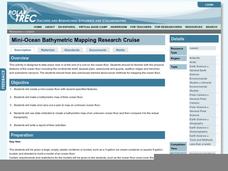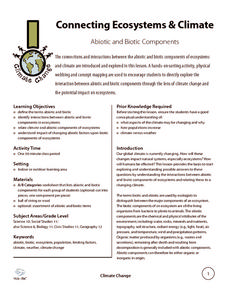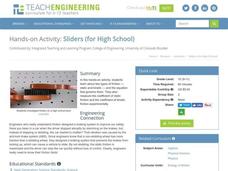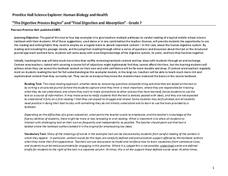Forest Foundation
Fire - How Does it Relate to You?
Forest fires can be a necessary step in keeping a forest healthy, but what happens when they get out of control? Learners investigate the causes and effects of forest fires in two specific areas, culminating in a report about the ways...
Polar Trec
Mini-Ocean Bathymetric Mapping Research Cruise
Middle or high schoolers transform into oceanographers in a week-long simulation. To begin, each group follows directions to create a model of the ocean floor with specified features. Next, the groups prepare to set sail on a research...
National Science Teachers Association
Paper Car Crash Design
High school physical scientists collide with motion. They work in pairs to design a paper car that will protect a raw egg during a head-on collision. Measurements of distance traveled, time of run, vehicle specs, and photo gate flags are...
Lesson Plans
Analogy of the Cell Project
Intended to supplement your existing cell function and organelle lessons, pairs work together to develop a real-world analogy for cell structures. In addition to writing paragraphs about the comparison, each group will make a short...
Wild BC
Connecting Ecosystems & Climate
Collaborators sort a set of cards into biotic and abiotic categories. Then, as a class, they discuss their work and relate each of the abiotic components to climate change. Finally, they form a web of components by connecting those that...
US Environmental Protection Agency
Types of Radiation
Learn about radiation, and what everyday items produce radiation, with a series of activities about heat transfer. Kids go over basic information about electromagnetic waves and ionizing radiation before performing several experiments...
NOAA
Seafood and Human Health
Whether your young biologists realize it or not, humans play a significant role in marine ecosystems. To help them understand this fact children first create graphical representations that show homo sapiens' place in marine food chains,...
Safe Drinking Water Foundation
I Want to Be an Engineer
Environmentalists turn into engineers! Your class explores the perspectives of an engineer and water keeper, including the necessary steps that are taken in order to build a water treatment facility.
Curated OER
Earthquakes: Sixth Grade Lesson Plans and Activities
Young seismologists learn more about plate tectonics with a set of pre-lab, lab, and post-lab lessons plans on earthquakes. After exploring how waves travel through various materials, sixth graders record their observations and draw...
EduGAINs
Form and Function
Will that structure survive the force? The differentiated lesson allows pairs to choose the structure they would like to construct and the building materials they wish to use. Individuals record their findings in the observation chart...
Teach Engineering
Bouncing Balls
How high will it bounce? Groups determine the height different balls bounce off of different surfaces. By performing the necessary calculations, they determine the initial and final momentum of the balls. The included worksheet provides...
University of California
Energy and Biomass Pyramids
Young scientists play tag as they act out the food pyramid in the ocean ecosystem. Energy circles pass from the smaller prey to the predators and at the end of the activity, a data chart and analysis questions allow pupils to apply their...
It's About Time
Volcanic Hazards: Flows
Did you know the largest volcano in our solar system is on Mars? Young scholars measure and experiment with how to predict lava and mud flows. This knowledge leads to better evacuation, safety, and preventative methods.
Teach Engineering
Sliders (for High School)
Slip sliding away. Groups investigates the two types of friction by running an experiment that allows them to calculate the coefficient of static friction and the coefficient of kinetic friction. The experiment uses a box, a basket, and...
Teach Engineering
Ramp and Review (for High School)
Rolling for momentum. As part of a study of mechanical energy, momentum, and friction, class members experiment rolling a ball down an incline and having it collide with a cup. Groups take multiple measurements and perform several...
Safe Drinking Water Foundation
To Filter or Not to Filter
Drinking clean water can be taken for granted. Explore the process and high cost of filtering water with a water pollution and filtration activity. Young scientist build a filtration system to filter polluted water, examine the economics...
Curated OER
Unit 2: Global to Local: Understanding My Place in the Hydrosphere
What does the ground around your home have to do with water pollution? Young ecologists learn about their local watershed and create their own cause-and-effect models of the hydrosphere.
Savvas Learning
"The Digestive Process Begins" and "Final Digestion and Absorption"
Want your class to digest text more thoroughly? Middle schoolers learn about the digestive system in the lesson and reinforce informational text reading skills through a variety of strategies. They engage in a close reading approach,...
Center for Learning in Action
Introduction to the States of Matter
Liquids, gases, and solids are the states of matter in which scholars investigate in a lesson plan that offers in-depth information and engaging activities that look into the three states and the changes their properties make when mixed...
Center for Learning in Action
Density
Explore the concept of density within states of matter—gases, liquids, and solids—through a group experiment in which young scientists test objects' texture, color, weight, size, and ability to sink or float.
Center for Learning in Action
Challenge with Solids, Liquids, and Gases
There's a container for every matter—liquid, solid, and gas. Pupils design three different containers, each with the capability to hold one of the states of matter, and share their design with the class.
Center for Learning in Action
Water—Changing States (Part 1)
Here is part one of a two-part lesson in which scholars investigate the changing states of water—liquid, solid, and gas. With grand conversation and up to three demonstrations, learners make predictions about what they think will happen...
Center for Learning in Action
Water – Changing States (Part 2)
Here is part two of a two-part instructional activity in which scholars investigate the changing states of water—liquid, solid, and gas—and how energy from heat changes its molecules. With grand conversation, two demonstrations, and one...
Department for Children, Schools and Families
Explaining Change Processes Using a Simple Particle Model of Matter
The more things change, the more they stay the same. This unit includes seven lessons starting with physical change and moving through to chemical change. Conservation of matter is explained clearly with multiple hands-on activities and...
Other popular searches
- Earth Science
- Physical Science
- Life Science
- Science Project
- Science Space
- Environment Science
- History of Science
- Environmental Science
- Pe Science
- Family and Consumer Science
- Consumer Science
- Social Science

























